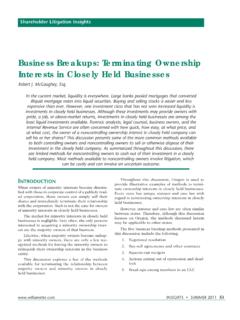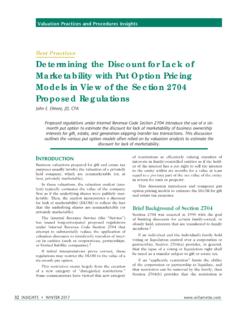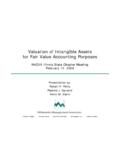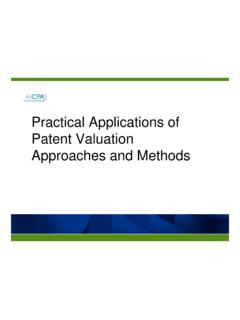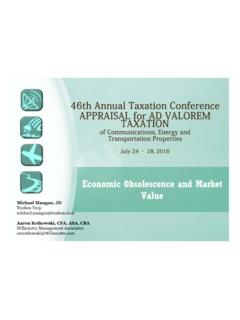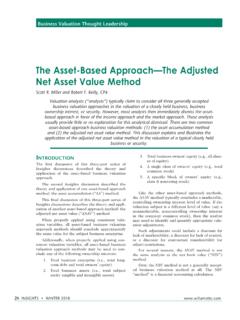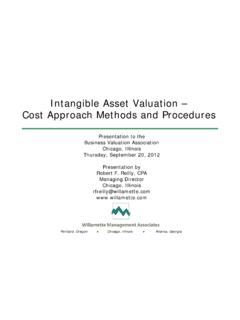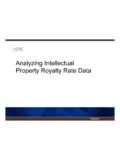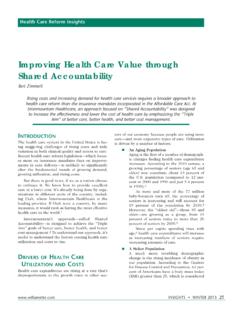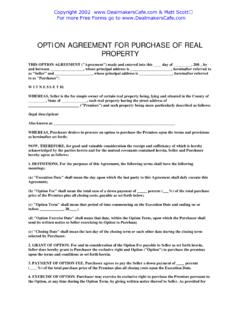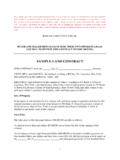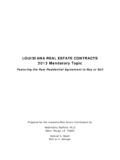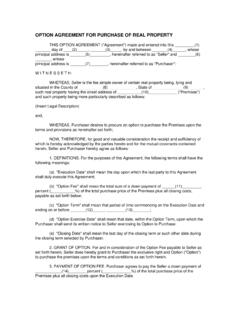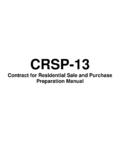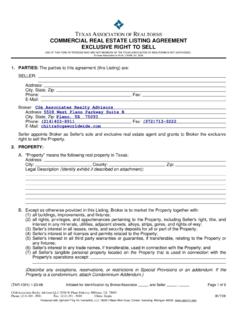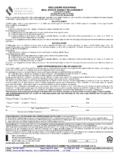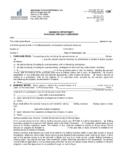Transcription of Tax Considerations of Close Corporation Buy/Sell …
1 40 INSIGHTS SPRING 2012 Considerations of Close Corporation Buy/Sell AgreementsRobert F. Reilly, CPAI ncome Tax Valuation InsightsValuation analysts are often involved in designing the valuation pricing formula included in Close Corporation and professional practice Buy/Sell agreements. In addition, valuation analysts are often asked to interpret or implement Buy/Sell agreements that call for a fair market value price or a price to be determined by an independent appraiser. In addition to quantifying the pricing aspects of Close Corporation Buy/Sell agreements, valuation analysts should be generally familiar with the taxation aspects of the common types of Buy/Sell agreements. This discussion summarizes the income tax implications of the common types of Buy/Sell onA Buy/Sell agreement is a contract that restricts business owners from freely transferring their own-ership interests in a closely held business. A Buy/Sell agreement is often used as a mechanism to provide for the planned and orderly transfer of a closely held business Buy/Sell agreement may be used by the owners of a Corporation , a partnership, a limited liability company, and many other forms of business enti-ties.
2 For simplicity purposes only, this discussion will refer to a closely held Corporation and to its corporate shareholders. However, for the most part, this discussion also applies to other ownership structures for closely held businesses and profes-sional are taxation as well as nontaxation ( , operational) reasons why closely held business own-ers may want to implement a Buy/Sell agreement program. This discussion considers both the taxa-tion reasons and the nontaxation of the reasons why Close Corporation shareholders may want to implement a Buy/Sell agreement include the following:1. To provide for business continuity upon the death, disability, or retirement of one of the Corporation shareholders2. To establish a market for the Close corpora-tion s stock that would otherwise be difficult to sell3. To ensure that the ownership of the subject Corporation remains with individuals previ-ously selected by the current owners or, at least, it remains closely held4.
3 To provide liquidity to the estate of a deceased shareholder in order to pay for the decedent s estate taxes and costs5. To support the family of a deceased share-holder from the proceeds of the Close corpo-ration stock saleOne of the often-mentioned disadvantages of a Buy/Sell agreement is that the cash paid for the premiums on the shareholders life insurance (that is typically used to fund the Buy/Sell agreement) is not available (1) for the payment of the Close cor-poration s expenses or investments or (2) to make distributions to course, it may happen that either corporate or personal circumstances may change after the shareholder Buy/Sell agreement is adopted. Such a change may cause the remaining shareholder pur-chasers to regret the contractual obligation to buy a withdrawing owner s INSIGHTS SPRING 2012 41In the context of a closely held Corporation , the Buy/Sell agreement is a contract either (1) between the shareholders or (2) between the shareholders and the contract provides that a shareholder s stock will be sold (or at least offered for sale) to the other shareholders or to the Close Corporation upon the occurrence of a contractually specified event.
4 Such contractually specified events usually include death, disability, and , such contractual events may also include circumstances such as a shareholder divorce, personal bankruptcy, or the inability to practice one s Buy/Sell agreement may also be designed as a right of first refusal in the event that a shareholder desires to sell his or her Close Corporation are three common types of Buy/Sell agree-ments:1. Redemption agreements2. Cross-purchase agreements3. Hybrid agreementsEach of these three types of Buy/Sell agreements is described Buy/Sell agreemenTsIn a redemption Buy/Sell agreement, the shareholder and the Close Corporation enter into a contract. In that contract, the shareholder agrees to sell his or her shares to the Close Corporation according to the price, terms, and circumstances specified in the Buy/Sell redemption Buy/Sell agreement typically grants the Close Corporation the right of first refusal if there is an offer from a third party to purchase the shareholder s ownership Close corporations have Buy/Sell agree-ments for valuing and purchasing the shares of (1) a deceased or disabled shareholder or (2) a share-holder whose employment with the Corporation has more than two shareholders are involved, and particularly when life or disability insurance is issued to fund the Buy/Sell agreement, then these buyouts are often structured as stock redemptions (paid for with corporate dollars).
5 In other words, the transaction is typically not a stock cross-purchase transaction between the stock redemption Buy/Sell agreement is a con-tractual arrangement between the shareholders and the Close Corporation . In that agreement, the Close Corporation is obligated to redeem the shares of the deceased or disabled the death or disability of the shareholder, that shareholder s stock must be returned to the Close Corporation for payment, according to the terms established in the Buy/Sell the stock redemption agreement is funded with life insurance or disability insurance, then the Close Corporation pays the insurance premiums. Also, the Close Corporation owns the insurance policy, and the Corporation is the policy s costs of the insurance premiums are then shared proportionately by all shareholders. This is because the Close Corporation is responsible for all of the insurance premium is, a younger shareholder or a shareholder owning fewer shares is not required to pay larger insur-ance premiums to cover (1) other older shareholders or (2) other shareholders who own more administration of such a Buy/Sell agreement is simplified because there is only one life insurance policy on each shareholder.
6 In addition, the legal agreement can be drafted as a single contrast, under a stock cross-purchase agree-ment, each individual shareholder must carry a life insurance policy on all of the other Corporation , the remaining shareholders do not receive any increase in their tax bases in the Close Corporation stock. This tax treatment contrasts with a stock cross-purchase Buy/Sell agreement. Under such agreement, the remaining sharehold-ers acquire the shares individually and, therefore, receive a corresponding increase in their tax addition, stock redemption payments that are treated as nonliquidating corporate distributions 42 INSIGHTS SPRING 2012 result in a taxable dividend for the shareholder recipient. This will be the case if the transaction fails to qualify as a stock sale under one of the Internal Revenue Code Section 302 or Section 303 course, the income tax results for a share-holder with little or no stock basis may be essen-tially the same whether the redemption is treated as (1) a taxable dividend or (2) stock sale is because the federal income tax rates on qualified dividends and long-term capital gains are the same for 2011 and , if the shareholder has significant capi-tal losses from other transactions, then sale treat-ment is preferred.
7 This is because those capital losses can be used to offset the capital gain triggered by the stock redemption redemptions have (1) complex income tax implications and (2) a high potential for adverse income tax consequences. Such unfavorable income tax consequences may include the following:1. If the Close Corporation pays more than the stock s fair market value (FMV), then the selling shareholder may have received (a) a gift from the remaining shareholders or (b) compensation from the If the Close Corporation pays less than the stock s FMV, then the remaining sharehold-ers may have received either a gift or com-pensation (Revenue Rule 58-614).3. To qualify for either sale or exchange treat-ment, the stock redemption must meet the applicable requirements. For example, if the Buy/Sell agreement calls for the sale of less than 100 percent of the shareholder s ownership interest, then the complete ter-mination or substantially disproportionate requirements of Section 302(b) may not be met.
8 This result would cause the distri-bution to the shareholder to be taxed as a dividend. However, based on the 2011 and 2012 preferential tax rates on qualified dividends, this outcome may not be as dis-advantageous as it used to If the Close Corporation is the beneficiary of a life or disability insurance policy that funds the stock redemption transaction, then the insurance proceeds could trig-ger the Corporation alternative minimum tax. This result is because the insurance proceeds would be included in the accumu-lated current earnings (ACE) adjustment (Regulations Section (g)-1(c)).For example, let s assume that Family Corporation ( Family ) has 1,000 shares of stock issued and out-standing. Alpha shareholder owns 800 shares. Beta shareholder and Gamma shareholder each own 100 shares. Alpha wants to retire and maintain a reduced ownership interest in s assume that Family redeems 600 of Alpha s shares.
9 After the redemption, Family has 400 shares issued and outstanding. Alpha owns 200 of those shares, resulting in a 50 percent ownership stock redemption does not qualify for sale or exchange treatment under Section 302. And, this redemption will be treated as a distribution of prop-erty under Section 301. To avoid this result, Alpha should restructure the transaction to qualify for capital gain treatment under Section Buy/Sell agreemenTsA cross-purchase Buy/Sell agreement is a contract between the shareholders of the Close Corporation . It is a contract to offer each shareholder s shares for sale to the other shareholders at the price and terms specified in the Buy/Sell the event of a shareholder s death, the estate is normally required to offer the decedent s owner-ship interest to the other shareholders at the con-tractually specified price and terms. If there is no third-party buyer, then the other shareholders are generally obligated to buy the shareholder s inter-est in the event of specified circumstances (such as death, disability, or retirement).
10 Cross-purchase agreements are normally funded with insurance. Therefore, these agreements function best when the Close Corporation has only two or three shareholders. As the number of shareholders increas-es, the cost of creating a workable cross-purchase arrangement can become too high. This is due to the larger number of insurance policies arrangements avoid the risk of dividend treatment for the selling shareholder s buyout payments. However, if the Close Corporation purchases the stock (even though the remaining shareholders were obligated to do so) because of a secondary agreement under the Buy/Sell agreement, the purchase could be treated as a constructive divi-dend to the remaining avoid the constructive dividend tax treat-ment, the Buy/Sell agreement should be structured so that the remaining shareholders have an option, rather than an obligation, to purchase the departing shareholder s addition, when the change in stock ownership qualifies as an ownership change under Sections INSIGHTS SPRING 2012 43382 to 384, the Close Corporation s ability to use certain tax attributes, such as an NOL and capital loss carryover, may be example, let s consider Delta and his two brothers, Eta and Theta.
